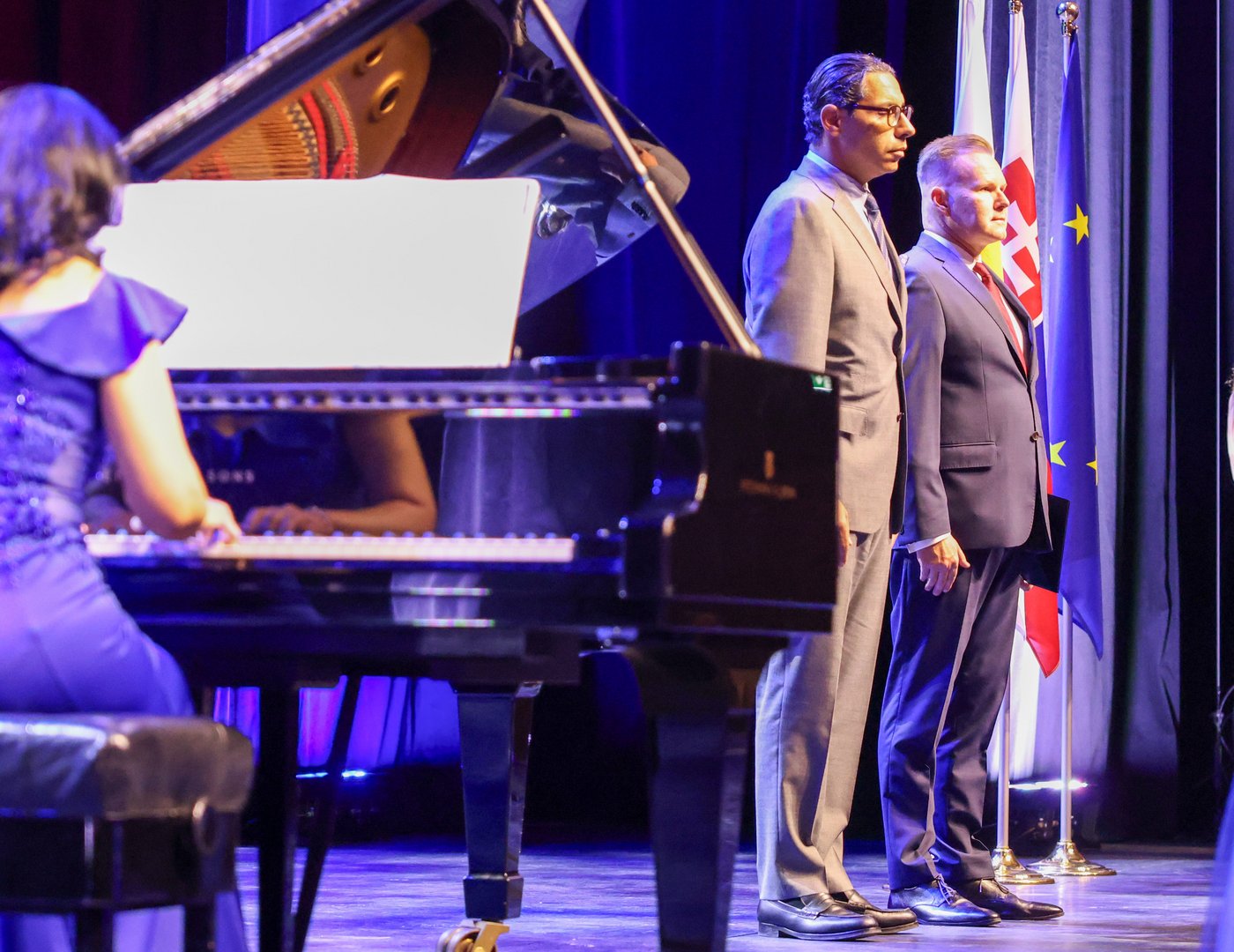The Slovak embassy in Nicosia celebrated the central European nation’s Constitution Day and 30 years of diplomatic relations between the Slovak Republic and the Republic of Cyprus with an event held at the Nicosia municipal theatre on Tuesday evening.
The event was attended by dignitaries representing diplomatic missions in Cyprus from all corners of the globe, as well as high-profile figures from Cypriot commerce, politics and media.
In the theatre’s entry hall, there was an exhibition documenting the 30 years of diplomatic relations between Cyprus and Slovakia.
The exhibition featured key moments in the two countries’ relations, including the multiple visits of the two countries’ presidents to each other’s countries, the extensive Slovak contribution to bicommunal efforts in Cyprus, the wealth of Slovak cultural events organised in Cyprus, and news reports on the key moments from, among other publications, the Cyprus Mail.
The event began with a speech from Slovak ambassador Martin Bezak, who said the day was for commemorating “the principles, values, basic rights, and freedoms that determine the character of our state”.
He said Cyprus and Slovakia are “connected not only by traditional friendship and cooperation, but also by the principles of international law and the values of the European Union, which they joined together on May 1, 2004”.
He went on to “emphasise and briefly evaluate the three principles of bilateral relations between Slovakia and Cyprus, which I would characterise as respect, assistance and the interaction”.
“Respecting the independence, sovereignty, and territorial integrity of states is particularly important in the current geopolitical and geopolitical context from the point of view of smaller states and nations, which also includes Slovaks and Cypriots,” he said.
Speaking on the extensive Slovak contribution to bicommunal efforts in Cyprus, he said “I am proud to add that three decades of providing good services of Slovakia in the Cyprus issue represent an unprecedented factor in the relationship between two EU member states in the history of European integration.
“Facilitating a bicommunal dialogue of representatives of Greek Cypriot and Turkish Cypriot political parties is our sui generis added value to the search for a Cyprus problem solution, he said.
He added that “more than 300 bicommunal meetings at the Ledra Palace hotel and more than 130 meetings of the preparatory subcommittee at the Home for Cooperation, which the Slovak ambassadors in Nicosia have organised so far, is tangible proof of that.”
He pointed to the efforts of UN Assistant Secretary General for Europe, Central Asia, and the Americas Miroslav Jenca, who is a Slovak national, as another example of the positive Slovak contribution to efforts to resolve the Cyprus problem.
“The same applied to the operation of approximately 4,500 Slovak soldiers and police officers who have so far been taking part in the UN peacekeeping force in Cyprus, where they are responsible for what is probably the most sensitive sector of the buffer zone.”
To that end, he made reference to the violent scenes witnessed in the buffer zone village of Pyla on August 18, saying peacekeepers “demonstrated their high professionalism and commitment to the UN mandate”.
He also mentioned that he expects more than 50,000 Slovak tourists to visit Cyprus this year, while 2,500 Slovaks “live, work, or do business” in Cyprus. He later made reference to the annual Reflect technology and business festival in Limassol, which he described as the “flagship of Slovak innovation diplomacy in Cyprus”.
Cypriot Foreign Minister Konstantinos Kombos also made a speech at the event, praising the “principled attitude of the Slovak contingent of Unficyp in the region of Pyla in recent days”.
He also said the Slovakian diplomatic mission in Cyprus “has contributed to the construction of close relations, cooperation, and friendship between the two countries and their peoples”.
“The Slovak offer of its good offices for a constructive dialogue between Greek Cypriot and Turkish Cypriot political parties paves the way for a common, mutual future.”
Following the speeches, a concert of Slovak musicians took place inside the theatre. The concert featured soprano singer Simona Eisinger and mother and daughter Aniko and Anabela Patkolo on the piano and violin respectively.
The trio performed a selection of music from Slovakia, as well as pieces by Joseph Haydn and Ludwig van Beethoven, and traditional Cypriot songs “Al Yemeni, Mor Yemeni” and “To Yiasemi”.







Click here to change your cookie preferences